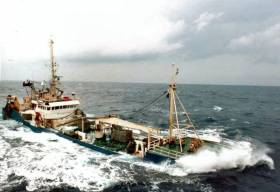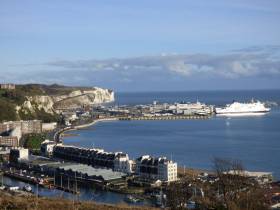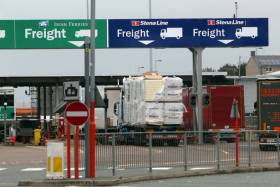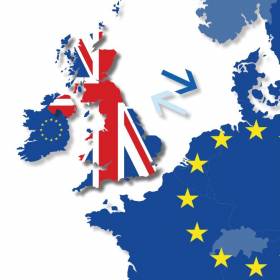Displaying items by tag: No Deal Brexit
Important transport networks across Scotland, reports The Herald, are at risk of grinding to a halt next month while essential services and even future housebuilding programmes could be axed after Brexit, according to council emergency planning documents.
Preparation and assessment documents written by Scotland’s 32 local authorities have revealed the impact that Brexit may have on local communities, including disruption to ferry services and international flights being unable to land.
For more on this click here.
As Afloat covered today, as part of the Brexit deal featuring an EU/UK customs border on the Irish Sea, where EU officials would be entitled to be present for checks at ferryports in the North, Scotland and England.
Irish State On Watch to Protect Sea Borders Amid Brexit Fears for Fishing
Both the Irish Naval Service and Air Corps, reports The Irish Times, are being primed to protect Irish sea fishing areas and vessels in a no-deal Brexit amid industry fears of tensions between EU and non-EU trawlers.
The UK crashing out of the EU without a deal would shut off British fishing waters to Irish trawlers and deprive the domestic fleet of access to lucrative fishing grounds that account for a third of the Irish catch.
The exclusion of fishing fleets from other EU member states from British waters would in turn increase the number of French, Spanish and Belgian trawlers in Irish fishing waters.
Sean O’Donoghue, chief executive of the Killybegs Fishermen’s Organisation, one of the country’s biggest fishing industry groups, warned that there would be “flashpoints” in the Irish Sea and waters off the north-west and south-west Irish coasts if no arrangements are put in place in the event of a no-deal Brexit.
The newspaper has more here on the story.
Increasing pressure, writes The Irish Times, is building on the Government to advance plans for alternative shipping routes bypassing Britain to avoid severe delays at English Channel ports stemming from a possible no-deal Brexit.
Potential risks to the key “landbridge” transit route for Irish traders through the UK to Europe have escalated in light of the UK government’s no-deal plans which show severe disruptions at British ports.
Operation Yellowhammer, the secret UK planning dossier leaked over the weekend, warns of significant interruptions at UK ports that could last up to three months after Brexit.
The report says up to 85 per cent of lorries travelling across the English Channel may not be ready for French customs, creating delays of two days and a severe bottleneck for Irish hauliers bound for Europe.
About 150,000 haulage units use the landbridge every year, leading to concerns among Irish businesses that there is insufficient capacity on direct shipping routes to Europe to offer an alternative for this traffic.
For more here into the ferry operators directly serving continental Europe.
#ferries - Representives from Irish hauliers the Journal.ie reports, have said that the no-deal Brexit test run at the Port of Dover was too little too late, and wasn’t representative of how bad the tailbacks could be.
On Tuesday, the UK government paid truck drivers to take part in a test of how one element of trade would be handled in the event of a no-deal.
The Port of Dover is Europe’s busiest ferry port, and is the second busiest in England; its cargo terminal handles 300,000 tonnes of freight annually.
A no-deal Brexit would see additional custom and regulatory checks at ports and airports, and possibly along the Irish border unless the Good Friday Agreement supersedes no-deal Brexit arrangements.
But the test was criticised as “a waste of time” and not accurate to how bad the traffic would actually be in the event of a no-deal.
Click here for more including a response from the Irish Freight Association.
Lorries Will Queue Across Anglesea from Holyhead to Bangor If A 'No Deal' Brexit, Says Councillor
#FerryNews - Lorries forming long queus across Anglesea, north Wales could stretch from Holyhead Port to Bangor if there's a "no deal" Brexit, says a councillor amid uncertainty over the impact on the port.
As the Daily Post reports, London and Brussels hope to agree a deal by the end of the year to avoid tariffs and trade barriers, but Theresa May's Chequers proposals have been criticised by both Brexiteers, who want a full clean break, and the European Union , who say it would undermine the single market.
In the EU referendum in 2016, Anglesey narrowly voted to leave the union, despite the local MP and AM campaigning for a remain vote.
This was despite warnings that some of the 1,000 jobs at Holyhead could be at risk if Northern Irish ports continued to enjoy a 'soft' border with the Republic of Ireland while more stringent checks were introduced at ports on the British mainland.
With Holyhead handling around 320,000 trucks a year, drivers could face long delays and tailbacks on the roads unless an agreement is reached with the European Union.
For more on the story click here concerning the UK's second biggest ferryport after the Port of Dover.
#Ports&Shipping - Following the recent publication of the UK Government’s advice on contingency planning for a ‘no deal’ Brexit outcome, the British Ports Association (BPA) has suggested that negotiators have it in their power to agree a deal that would end months of uncertainty regarding the future arrangements at UK and EU borders.
Highlighting the merits of the UK Government’s proposal agreed at Chequers and subsequently set out in the Brexit White Paper in July, the BPA is urging both sides to rally and agree.
According to the BHA's Chief Executive Richard Ballantyne said: “The paper underlines the implications of a ‘no deal’, in terms of trading arrangements at ports. While it is sensible that the Government considers all outcomes we are hopeful that both sides will want to ensure that ports are free flowing on day one.
For parts of the ports industry, namely Roll-on Roll-off port operations, which handle the majority of the UK’s trade with the EU, a ‘no-deal’ could be a serious challenge and lead to significant disruption at the border. The Chequers agreement and the Government’s Brexit White Paper proposals offered a solution to the challenge of possible new customs and borders checks, which to date appears to be the only viable option. We would urge Michel Barnier and his colleagues to seriously consider this proposal. Without agreement the fluidity of tens of thousands of freight vehicles which travel between the UK and the EU on a daily basis is at stake. It is vital that we get this right. Over the last two years we have had productive discussions with the UK Government on Brexit and we do feel that UK officials have crafted a viable plan which with some preparation would work for both sides. This would mean we avoid the significant disruption that may occur at certain ports that are important international gateways for both the UK and the EU.”
Leaving the EU Customs Union and Single Market means that without some form of agreement goods travelling to and from Europe will be subject to new authorisations and other requirements as of March 2019. Included in the UK Government’s ‘no-deal’ advice is that traders will need to undertake new border processes which could be most challenging for freight on lorries travelling through ‘roll-on roll-off’ ferry port gateways. These are ports such as Dover, Holyhead, Immingham and Portsmouth and Ro-Ro ports collectively facilitate the majority of the UK’s EU trade. There will of course be opportunities for IT solutions for customs procedures but these could take time and all those in the logistics chain will need to assess how they will meet the new arrangements.
For most other types of ports handling bulks and containerised cargo, the likely new customs procedures should be relatively straightforward to achieve. However there are still questions around other frontier inspections such as port health standards which are mandated under EU law and without agreement will be difficult to overcome, particularly in respect of the UK’s exports through the EU.
The UK Government’s ‘no-deal’ advisory notices on trading with the EU can be read or downloaded by clicking here.
Afloat adds the Irish Maritime Development Office (IMDO) also has the full document (PDF download) from the EU Commission on preparing for the withdrawal of the UK from the European Union. Also for more related coverage, click here.

































































